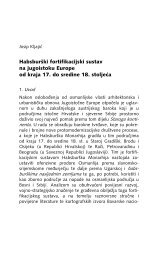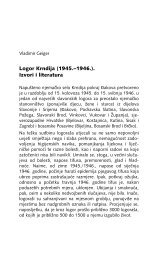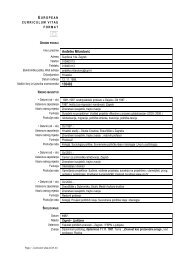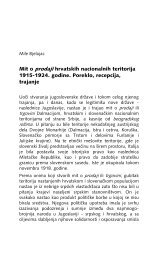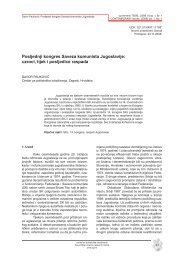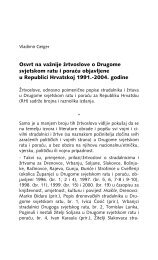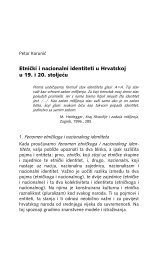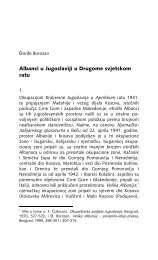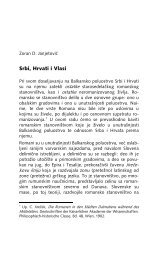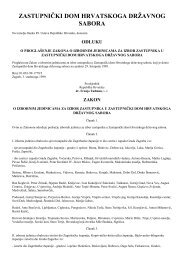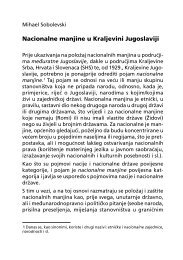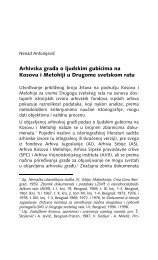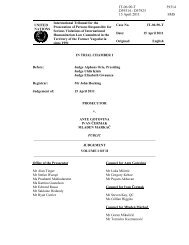Plamena Pehlivanova: The Decline of Trust in Post-communist Societiessuvremene TEME, (<strong><strong>2009</strong>.</strong>) God. 2, Br. 1CONTEMPORARY issues, (<strong>2009</strong>) Vol. 2, No. 1Table 1Confidence in InstitutionsPresident 71%Army 55%Police 51%Local Government 40%Banking System 37%Cabinet 30%ProsecutionCourts of LawParliament18%18%15%* Survey conducted by Gallup, July20053. History and Old AgeThe political and social behavior of theBalkans can be explained by the inherited cultureof traditional antagonism that relates not only totheir communist past. Nikolay Valkov describesthis behavior as formed around culture, historyand the political model of the country. (Valkov,<strong>2009</strong>) Furthermore, his study closely comparesthe resemblance between Latin European countriesto post-communist countries in their democraticpolitical model and low voluntary organisationalmembership. It could be argued thatthe interpersonal relations on the micro-levelinfluence the social and political structure of thestate. Nevertheless, through his analysis, Valkovopposes this theory and concludes that the lowassociational life model in post-communist societiesis not necessary correlated with their democraticperformance. Instead, he believes that thelow membership rates should be understood assomething which has its own internal logic andexplanation. “The origins lie in the nature of thesocietal transformation in the region.” (Valkov,<strong>2009</strong>: 14). Bulgarians in this way are less boundto the values of individual worthiness. Their socialsolidarity is a hybrid of the old structured collectivismthat emerged as structures during thetransition, believes Plamen Georgiev.Eastern and Central Europe have goodreason to distrust the government, since theyhave lived in authoritarian regimes, some moretotalitarian than others, forced to subjugate individualinterest to those of the Communist Party.Social participation in “volunteer” and politicalorganisations was advocated (if not enforced),which led to drastic decline in any kind of politicalor civic organisations after the fall of communism.With the fall of the regime, the reactionwas a massive alienation and distrust towardthe communist regime and “lingering cynicismtoward political and civil institutions” (Georgiev,2007:138). One may speculate that with thefall of the regime, there would have been ancentar za politološka istraživanjathe political science research centrewww.cpi.hr34
Plamena Pehlivanova: The Decline of Trust in Post-Communist Societiessuvremene TEME, (<strong><strong>2009</strong>.</strong>) God. 2, Br. 1CONTEMPORARY issues, (<strong>2009</strong>) Vol. 2, No. 1increase in social participation and enthusiasmfor independent civic and cultural organisations.As Nikolay Valkov states in his study of postcommunistcountries, there is an expectationthat vigorous civic engagement precedes, triggers,or follows democratization of an authoritarianpolitical regime. (Valkov, <strong>2009</strong>: 2). However,with the development of democracy in Bulgariaand Russia (1990-1999) the World Value Surveyshows a decline in civic and political activism.The reappearance of democracy in Eastern andCentral Europe coincided with the decline in associationalactivity. In relation to decline in socialparticipation, we also witness a decline in politicaland civic trust. Contrary to the Tocquevillianmodel, which infers that democratic systemsincrease participation, it seems that post-communistsocieties such as Russia and Bulgaria donot necessary manifest the inferred high voluntaryactivism.To the question: “Can most people betrusted?”- Bulgaria (1997-1999) witnessed 8%decline, while Russia (1990-1999) witnesseda 15.7% decline. Confidence in Parliament declined:in Bulgaria (1990-1999) with 24% and inRussia (1990-1999) with 22%. The New DemocraciesBarometer (2001) exhibits Bulgaria andRomania as the countries with the highest levelof distrust among the new democracies. The resultshere reflect the difference in experience ofeach country under communism. Furthermore,William Mishler and Robert Rose speculate thatmost citizens don’t distinguish between institutionsof state and society but they judge themholistically and evaluate them sceptically. (Mishler,Rose, 1997: 420). This argument resemblesthe one put forward by Thompson in CulturalTheory (Ellis,Thompson, Wildavski, 1990), andis ambitious enough to involve future studies onhow fatalism affects participation. Why did trustdecline and continues to decline in Bulgaria? Onthe other hand, how can we compare the Chinesesocial model to Bulgaria and Russia?Trust is to be consequentially developedby the society and it needs to come from thepositive performance of political and civil institutionsthat, as Hirschman says, is measured by“reasonable measure of individual and collectivegood” (Hirschman, 1970: 58). Trust is initiallyvery important for the development of democracyin post-communist countries like Bulgariaand Russia. “Trust in civil institution doesn’t diminishdemocracy but completes it, enhancingthe effectiveness of political institutions” (Mishler,Rose, 1997: 420). In the case of Bulgariaand Russia, one can speculate that the fall of theregime witnessed an increase in social activism,which adopted “the fight for democracy” as theirslogan. However, the legitimacy of institutionswas no longer judged by ideology but by performance.Thus, the economic downfall resulted indecreased political trust and participation, andincreased social dissatisfaction. The StandardEurobarometer Analysis of 2008 states the following:“Bulgarians continue to be least satisfiedwith their way of life of the entire Eurobarometerpoll (59%). However, while,in the spring (2008), they felt stronglythe positive effects of EU membershipand their life satisfaction was on the rise,reaching its highest scores (40%), now– under the influence of the crisis, it hasdecreased (by 2 points). This strong dissatisfactionwith life may be explainedby the unanimous opinion of citizensthat compared to the average in the Europeancountries, the situation in Bulgariais worse in all areas: 88% give anegative assessment regarding the situationof the national economy, 77% - regardingthe employment situation, 84%- regarding energy prices, and at leastnine out of ten interviewed – regardingthe cost of living (92%) and the qualityof life (93%).” (Standard Eurobarometer70, 2008)The growing income gap between thepeople and the insufficient pensions also furtheredthe antagonism in Bulgaria. When asked:“How would you rate the current retirement fundsin Bulgaria?”, 82% of the Bulgarians answer as“Bad + Very Bad”, while only 52% of the EuropeanUnion population reports the same. Bulgariaand Hungary are presented as the EuropeanStates with the highest dissatisfaction ratein their retirement funds. At the same time, 25%of Bulgarian households report in WVS to havethe minimum salary income, in comparison tothe only 9% of Russian, and 2% of Chinese andDutch households. While we see highly skeweddata for Russia and Bulgaria, Chinese and Dutchdata have a rather uniform bell-shaped distribution.Do income and retirement funds affect participation?The data show that Bulgarians withlowest income levels tend not to participate involuntary organisations. However, income is notthe only cause for decline in participation; ageproves to be another important factor that wehave to control for.centar za politološka istraživanjathe political science research centrewww.cpi.hr35



